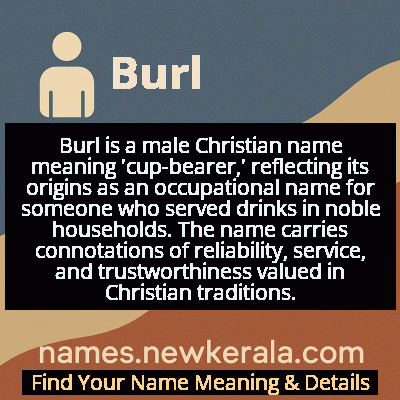Burl Name Meaning & Details
Origin, Popularity, Numerology Analysis & Name Meaning of Burl
Discover the origin, meaning, and cultural significance of the name BURL. Delve into its historical roots and explore the lasting impact it has had on communities and traditions.
Name
Burl
Gender
Male
Origin
Christian
Lucky Number
8
Meaning of the Name - Burl
Burl is a male Christian name meaning 'cup-bearer,' reflecting its origins as an occupational name for someone who served drinks in noble households. The name carries connotations of reliability, service, and trustworthiness valued in Christian traditions.
Burl - Complete Numerology Analysis
Your Numerology Number
Based on Pythagorean Numerology System
Ruling Planet
Saturn
Positive Nature
Ambitious, efficient, realistic, and authoritative.
Negative Traits
Materialistic, stressed, confrontational, and can be overly ambitious.
Lucky Colours
Dark blue, black.
Lucky Days
Saturday.
Lucky Stones
Blue sapphire, amethyst.
Harmony Numbers
2, 4, 6.
Best Suited Professions
Business leaders, managers, financial services, law enforcement.
What People Like About You
Leadership, determination, organizational skills.
Famous People Named Burl
Burl Ives
Singer and Actor
Academy Award-winning actor and folk music icon
Burl Osborne
Journalist
Transformed The Dallas Morning News and served as AP president
Burl Toler
Sports Official
First African-American official in NFL history
Burl Carraway
Baseball Player
Professional pitcher in Chicago Cubs organization
Name Variations & International Equivalents
Click on blue names to explore their detailed meanings. Gray names with will be available soon.
Cultural & Historical Significance
In American Christian culture, the name gained prominence during the 19th and early 20th centuries, often chosen by families valuing traditional virtues and biblical principles of service. The name's popularity was reinforced by the fame of folk singer Burl Ives, whose wholesome image and Christmas specials made the name familiar to generations of Americans. Throughout its history, the name has maintained connections to rural and working-class values while simultaneously representing the dignity found in faithful service—a theme deeply embedded in Christian parables and teachings about the importance of serving others.
Extended Personality Analysis
People named Burl are typically characterized by their steadfast reliability and practical approach to life. They tend to be individuals who value consistency and tradition, often serving as stabilizing forces within their families and communities. Their personality reflects the name's historical roots in service occupations, manifesting as a strong sense of responsibility and commitment to their duties. Burls are usually patient, methodical thinkers who prefer proven methods over untested innovations, making them excellent in roles requiring attention to detail and long-term planning.
Socially, Burls often present as reserved but deeply loyal individuals who form strong, lasting relationships with those they trust. They typically avoid the spotlight, preferring to work behind the scenes where their contributions, while essential, may go unnoticed by broader audiences. This humility combined with quiet competence often earns them respect and admiration from those who work closely with them. Their strength lies not in flashy achievements but in consistent, dependable performance over time—qualities that make them invaluable in both professional and personal contexts. While they may not be the most outgoing individuals in social settings, their genuine care for others and willingness to help without expectation of reward endears them to those who appreciate substance over style.
Modern Usage & Popularity
In contemporary naming practices, Burl has become quite uncommon, typically ranking outside the top 1000 baby names in English-speaking countries. Its usage today is primarily limited to families with strong traditional values, those seeking vintage names with historical significance, or families carrying the name through generations. The name experiences occasional minor revivals as part of the broader trend toward old-fashioned names, particularly among parents interested in occupational surnames or names with English heritage. While rarely chosen in urban and cosmopolitan areas, it maintains some presence in rural communities and regions with strong historical connections to English and Scottish naming traditions. Modern bearers of the name often appreciate its distinctive quality in an era dominated by more popular names, though some may opt to use it as a middle name to honor family tradition while selecting more contemporary first names for daily use.
Symbolic & Spiritual Meanings
Symbolically, the name Burl carries rich metaphorical meanings derived from both its occupational origins and linguistic associations. As a cup-bearer, the name represents service, nourishment, and trust—the individual who sustains others while operating in a position of confidence and responsibility. This connects to broader spiritual symbolism of the cup as a vessel of life, community, and sacred offering. In Christian context, this aligns with biblical imagery of drinking from the cup of salvation and the shared communion cup, making the name emblematic of spiritual service and community building. Additionally, the homophone relationship with 'burl' in woodworking—those unique, dense growths in trees that create beautiful grain patterns—adds another layer of symbolism. This suggests individuals who may appear ordinary externally but possess extraordinary strength, resilience, and inner beauty, much like the burl wood that is both structurally strong and aesthetically prized by craftsmen.

